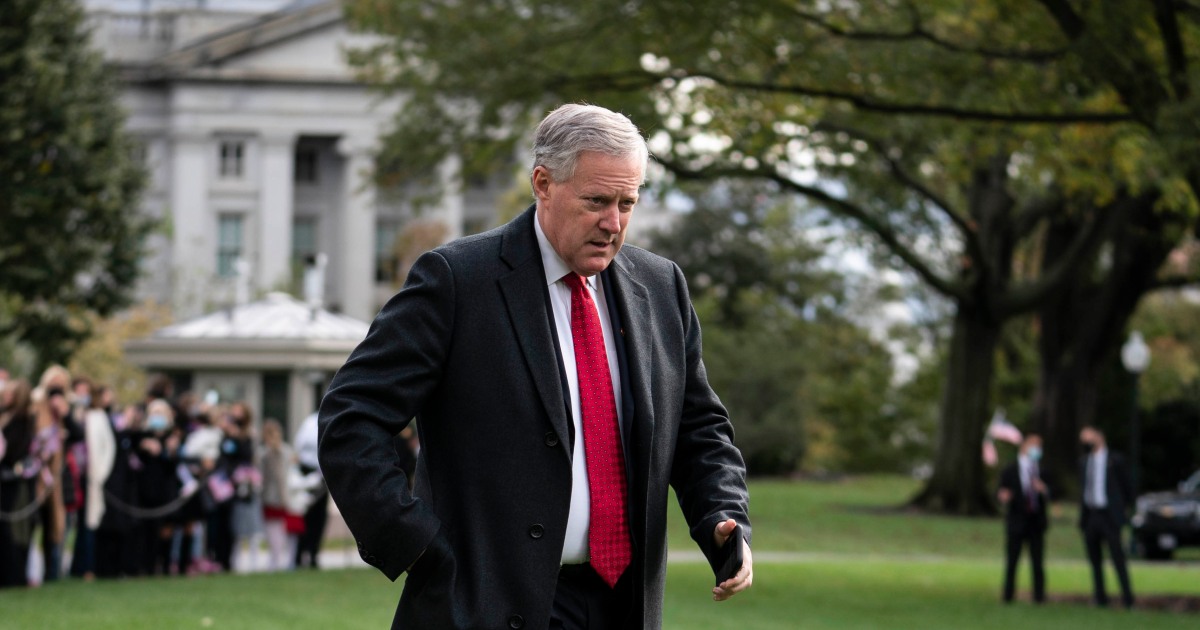
A lawyer for Mark Meadows has sent a letter to the House committee investigating the Jan. 6 attacks arguing that the former White House chief of staff should not be subject to criminal contempt of Congress charges.
The committee is set to vote Monday night to recommend charges against Meadows, who said last week that he would no longer cooperate with the investigation.
The lawyer, George J. Terwilliger III, said that a contempt referral would be contrary to law, “because a good-faith invocation of executive privilege and testimonial immunity by a former senior executive official is not a violation” of the statute, especially when that person is relying on the advice of counsel.
Terwilliger, who was deputy attorney general in the George H.W. Bush administration, argues in the letter that a criminal referral would violate the “long-held and well-established separation of powers principles.”
The letter makes a series of arguments for why executive privilege should shield close advisers to the president from having to testify before Congress. But it doesn’t tackle the question of why executive privilege should apply to a former official when the current president is not invoking it — a question that is central in the legal fight over former President Donald Trump’s records.
The committee alleged Sunday in a report supporting the contempt referral that Meadows wrote an email the day before the riots saying that National Guard troops would keep Trump’s supporters safe on Jan. 6. The recipient of the email is not identified.
“Mr. Meadows sent an email to an individual about the events on January 6 and said that the National Guard would be present to ‘protect pro Trump people’ and that many more would be available on standby,” the report said.
Meadows’ lawyer did not address that alleged email in his letter and he declined to comment.
Meadows’ attempt to push back against a Congressional criminal referral also comes after a federal appeals court ruled Thursday that Trump cannot prevent the Jan. 6 committee from getting hundreds of documents that were created when he was in the White House.
A three-judge panel of the U.S. Court of Appeals for the District of Columbia ruled that although Trump retained some authority to claim executive privilege, it was not strong enough to overcome President Joe Biden’s decision that Congress has a legitimate need for the material.
“The executive privilege for presidential communications is a qualified one that Mr. Trump agrees must give way when necessary to protect overriding interests. The president and the legislative branch have shown a national interest in and pressing need for the prompt disclosure of these documents,” Judge Patricia Millett wrote for the court.
In addition to arguing that executive privilege applies, Meadows’ lawyer makes a more narrow argument for why his client cannot be guilty of a crime — that he relied on his lawyers.
“A senior executive official who refuses to provide privileged information or who refuses to testify based on a good-faith belief that their legal position is one that is required and supported by lawful authority does not ‘willfully’ default on a congressional subpoena,” Terwilliger wrote.
Legal experts say it’s an open question whether the “advice of counsel” defense can apply here. It is also being invoked by Steve Bannon, who is facing criminal contempt charges brought by the Justice Department after he, too, refused to honor the Jan. 6 committee subpoena.
Source: | This article originally belongs to Nbcnews.com










